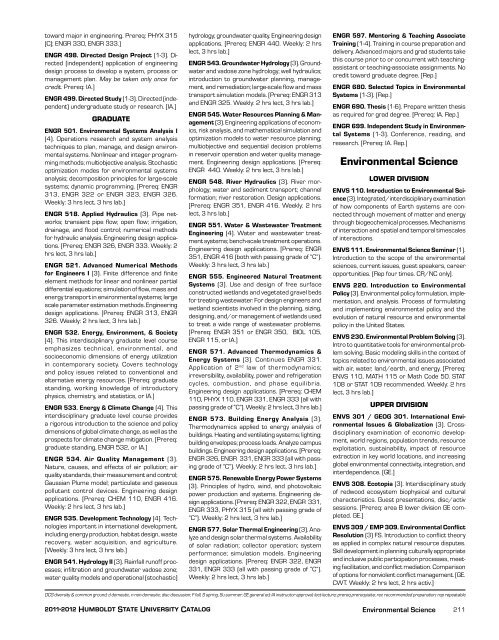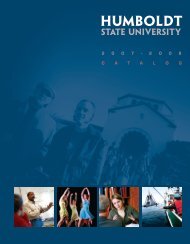2011-12 Academic Year - Bad Request - Humboldt State University
2011-12 Academic Year - Bad Request - Humboldt State University
2011-12 Academic Year - Bad Request - Humboldt State University
Create successful ePaper yourself
Turn your PDF publications into a flip-book with our unique Google optimized e-Paper software.
toward major in engineering. Prereq: PHYX 315<br />
(C); ENGR 330, ENGR 333.]<br />
ENGR 498. Directed Design Project (1-3). Directed<br />
(independent) application of engineering<br />
design process to develop a system, process or<br />
management plan. May be taken only once for<br />
credit. Prereq: IA.]<br />
ENGR 499. Directed Study (1-3). Directed (independent)<br />
undergraduate study or research. [IA.]<br />
GRADUATE<br />
ENGR 501. Environmental Systems Analysis I<br />
(4). Operations research and system analysis<br />
techniques to plan, manage, and design environmental<br />
systems. Nonlinear and integer programming<br />
methods; multiobjective analysis. Stochastic<br />
optimi zation modes for environmental systems<br />
analysis; decomposition principles for large-scale<br />
systems; dynamic programming. [Prereq: ENGR<br />
313, ENGR 322 or ENGR 323, ENGR 326.<br />
Weekly: 3 hrs lect, 3 hrs lab.]<br />
ENGR 518. Applied Hydraulics (3). Pipe networks;<br />
transient pipe flow; open flow; irrigation,<br />
drainage, and flood control; numerical methods<br />
for hydraulic analysis. Engineering design applications.<br />
[Prereq: ENGR 326, ENGR 333. Weekly: 2<br />
hrs lect, 3 hrs lab.]<br />
ENGR 521. Advanced Numerical Methods<br />
for Engineers I (3). Finite difference and finite<br />
element methods for linear and nonlinear partial<br />
differential equations; simulation of flow, mass and<br />
energy transport in environmental systems; large<br />
scale parameter estimation methods. Engineering<br />
design applications. [Prereq: ENGR 313, ENGR<br />
326. Weekly: 2 hrs lect, 3 hrs lab.]<br />
ENGR 532. Energy, Environment, & Society<br />
(4). This interdisciplinary graduate level course<br />
emphasizes technical, environmental, and<br />
socioeconomic dimensions of energy utilization<br />
in contemporary society. Covers technology<br />
and policy issues related to conventional and<br />
alternative energy resources. [Prereq: graduate<br />
standing, working knowledge of introductory<br />
physics, chemistry, and statistics, or IA.]<br />
ENGR 533. Energy & Climate Change (4). This<br />
interdisciplinary graduate level course provides<br />
a rigorous introduction to the science and policy<br />
dimensions of global climate change, as well as the<br />
prospects for climate change mitigation. [Prereq:<br />
graduate standing, ENGR 532, or IA.]<br />
ENGR 534. Air Quality Management (3).<br />
Na ture, causes, and effects of air pollution; air<br />
quality standards, their measurement and control;<br />
Gaussian Plume model; particulate and gaseous<br />
pollutant control devices. Engineering design<br />
applications. [Prereq: CHEM 110, ENGR 416.<br />
Weekly: 2 hrs lect, 3 hrs lab.]<br />
ENGR 535. Development Technology (4). Technologies<br />
important in international development,<br />
including energy production, habitat design, waste<br />
recovery, water acquisition, and agricul ture.<br />
[Weekly: 3 hrs lect, 3 hrs lab.]<br />
ENGR 541. Hydrology II (3). Rainfall runoff processes;<br />
infiltration and groundwater vadose zone;<br />
water quality models and operational (stochas tic)<br />
DCG diversity & common ground; d domestic, n non-domestic; disc discussion; F fall, S spring, Su summer; GE general ed; IA instructor approval; lect lecture; prereq prerequisite; rec recommended preparation; rep repeatable<br />
<strong>2011</strong>-20<strong>12</strong> <strong>Humboldt</strong> <strong>State</strong> <strong>University</strong> Catalog<br />
hydrology; groundwater quality. Engineering design<br />
applications. [Prereq: ENGR 440. Weekly: 2 hrs<br />
lect, 3 hrs lab.]<br />
ENGR 543. Groundwater Hydrology (3). Groundwater<br />
and vadose zone hydrology; well hydraulics;<br />
introduction to groundwater planning, management,<br />
and remediation; large-scale flow and mass<br />
transport simulation models. [Prereq: ENGR 313<br />
and ENGR 325. Weekly: 2 hrs lect, 3 hrs lab.]<br />
ENGR 545. Water Resources Planning & Management<br />
(3). Engineering applications of economics,<br />
risk analysis, and mathematical simulation and<br />
optimization models to water resource planning;<br />
multiobjective and sequential decision problems<br />
in reservoir operation and water quality management.<br />
Engineering design applications. [Prereq:<br />
ENGR 440. Weekly: 2 hrs lect, 3 hrs lab.]<br />
ENGR 548. River Hydraulics (3). River morphology;<br />
water and sediment transport; channel<br />
formation; river restoration. Design applications.<br />
[Prereq: ENGR 351, ENGR 416. Weekly: 2 hrs<br />
lect, 3 hrs lab.]<br />
ENGR 551. Water & Wastewater Treatment<br />
Engineering (4). Water and wastewater treatment<br />
systems; bench-scale treatment operations.<br />
Engineering design applications. [Prereq: ENGR<br />
351, ENGR 416 (both with passing grade of “C”).<br />
Weekly: 3 hrs lect, 3 hrs lab.]<br />
ENGR 555. Engineered Natural Treatment<br />
Systems (3). Use and design of free surface<br />
constructed wetlands and vegetated gravel beds<br />
for treating wastewater. For design engineers and<br />
wetland scientists involved in the planning, sizing,<br />
designing, and/or management of wetlands used<br />
to treat a wide range of wastewater problems.<br />
[Prereq: ENGR 351 or ENGR 350, BIOL 105,<br />
ENGR 115, or IA.]<br />
ENGR 571. Advanced Thermodynamics &<br />
Energy Systems (3). Continues ENGR 331.<br />
Application of 2nd law of thermodynamics;<br />
irreversibility, availability, power and refrigeration<br />
cycles, combustion, and phase equilibria.<br />
Engineering design applications. [Prereq: CHEM<br />
110, PHYX 110, ENGR 331, ENGR 333 (all with<br />
passing grade of “C”). Weekly: 2 hrs lect, 3 hrs lab.]<br />
ENGR 573. Building Energy Analysis (3).<br />
Thermodynamics applied to energy analysis of<br />
buildings. Heating and ventilating systems; lighting;<br />
building envelopes; process loads. Analyze campus<br />
buildings. Engineering design applications. [Prereq:<br />
ENGR 326, ENGR 331, ENGR 333 (all with passing<br />
grade of “C”). Weekly: 2 hrs lect, 3 hrs lab.]<br />
ENGR 575. Renewable Energy Power Systems<br />
(3). Principles of hydro, wind, and photovoltaic<br />
power production and systems. Engineering design<br />
applications. [Prereq: ENGR 322, ENGR 331,<br />
ENGR 333, PHYX 315 (all with passing grade of<br />
“C”). Weekly: 2 hrs lect, 3 hrs lab.]<br />
ENGR 577. Solar Thermal Engineering (3). Analyze<br />
and design solar thermal systems. Availability<br />
of solar radiation; collector operation; system<br />
performance; simulation models. Engineering<br />
design applications. [Prereq: ENGR 322, ENGR<br />
331, ENGR 333 (all with passing grade of “C”).<br />
Weekly: 2 hrs lect, 3 hrs lab.]<br />
ENGR 597. Mentoring & Teaching Associate<br />
Training (1-4). Training in course preparation and<br />
delivery. Advanced majors and grad students take<br />
this course prior to or concurrent with teachingassistant<br />
or teaching-associate assignments. No<br />
credit toward graduate degree. [Rep.]<br />
ENGR 680. Selected Topics in Environmental<br />
Systems (1-3). [Rep.]<br />
ENGR 690. Thesis (1-6). Prepare written thesis<br />
as required for grad degree. [Prereq: IA. Rep.]<br />
ENGR 699. Independent Study in Environmental<br />
Systems (1-3). Conference, reading, and<br />
research. [Prereq: IA. Rep.]<br />
Environmental Science<br />
LOWER DIVISION<br />
ENVS 110. Introduction to Environmental Science<br />
(3). Integrated/interdisciplinary examination<br />
of how components of Earth systems are connected<br />
through movement of matter and energy<br />
through biogeochemical processes. Mechanisms<br />
of interaction and spatial and temporal timescales<br />
of interactions.<br />
ENVS 111. Environmental Science Seminar (1).<br />
Introduction to the scope of the environmental<br />
sciences, current issues, guest speakers, career<br />
opportunities. [Rep four times. CR/NC only].<br />
ENVS 220. Introduction to Environmental<br />
Policy (3). Environmental policy formulation, implementation,<br />
and analysis. Process of formulating<br />
and implementing environmental policy and the<br />
evolution of natural resource and environmental<br />
policy in the United <strong>State</strong>s.<br />
ENVS 230. Environmental Problem Solving (3).<br />
Intro to quantitative tools for environmental problem<br />
solving. Basic modeling skills in the context of<br />
topics related to environmental issues associated<br />
with air, water, land/earth, and energy. [Prereq:<br />
ENVS 110, MATH 115 or Math Code 50. STAT<br />
108 or STAT 109 recommended. Weekly: 2 hrs<br />
lect, 3 hrs lab.]<br />
UPPER DIVISION<br />
ENVS 301 / GEOG 301. International Environmental<br />
Issues & Globalization (3). Crossdisciplinary<br />
examination of economic development,<br />
world regions, population trends, resource<br />
exploitation, sustainability, impact of resource<br />
extraction in key world locations, and increasing<br />
global environmental connectivity, integration, and<br />
interdependence. [GE.]<br />
ENVS 308. Ecotopia (3). Interdisciplinary study<br />
of redwood ecosystem biophysical and cultural<br />
characteristics. Guest presentations, disc/activ<br />
sessions. [Prereq: area B lower division GE completed.<br />
GE.]<br />
ENVS 309 / EMP 309. Environmental Conflict<br />
Resolution (3) FS. Introduction to conflict theory<br />
as applied in complex natural resource disputes.<br />
Skill development in planning culturally appropriate<br />
and inclusive public participation processes, meeting<br />
facilitation, and conflict mediation. Comparison<br />
of options for nonviolent conflict management. [GE.<br />
CWT. Weekly: 2 hrs lect, 2 hrs activ.]<br />
Environmental Science<br />
211

















